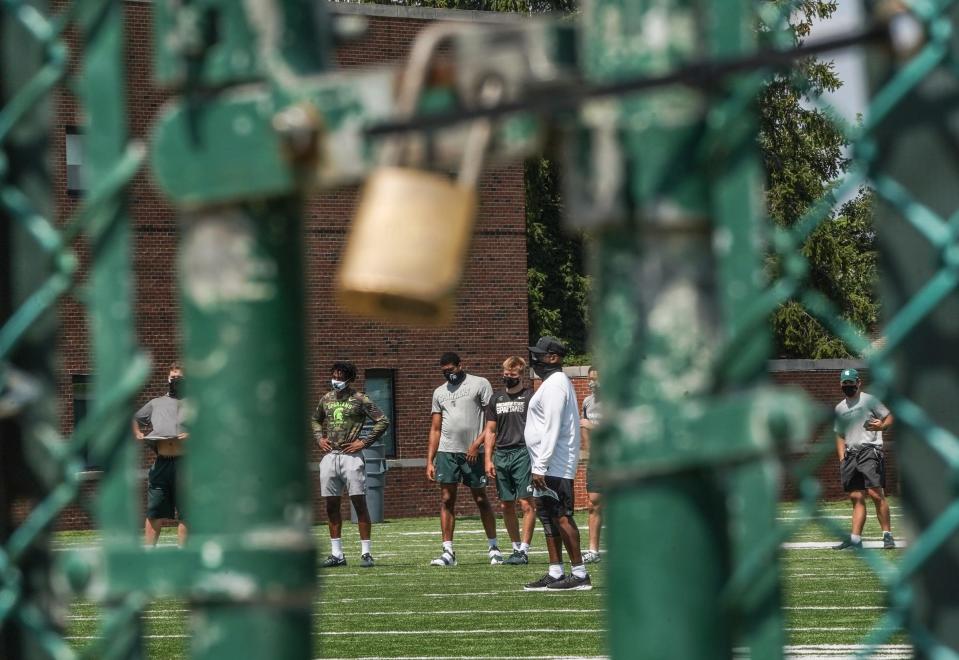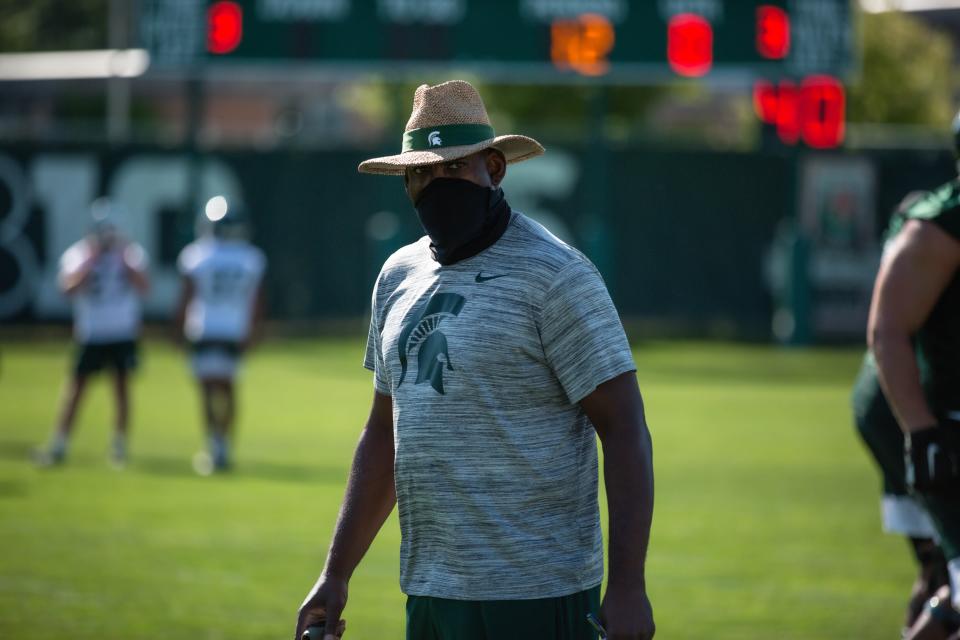Michigan State football players want to play, but understand Big Ten's decision to delay season
Matt Allen knew something was amiss.
Rumors were swirling around Michigan State’s football team Aug. 10 when their scheduled day off was moved to that day, though walkthroughs were held. Nothing official was announced, so the Spartans returned the next day for practice, even though the Big Ten limited them and other teams from moving into full pads.
That Tuesday, during period 11 of a 20-period practice, new coach Mel Tucker pulled his players off the outdoor field and into the indoor facility and delivered the news: there would be no football this fall.
[ The Free Press has started a new digital subscription model. Here's how you can gain access to our most exclusive Spartans content. ]
“It was kind of suspicious because we've never done anything like that. So we kind of were expecting the worst,” Allen, a senior offensive lineman, said Wednesday during a video conference call. “A lot of guys were just kind of in shock at first, and they didn't really believe it because you see all the rumors on Twitter, and you don't know like how accurate it is. So when the news actually hit and it was real, it was just kind of like, ‘Wow.’”

It took some processing, but four MSU veterans all explained why they accepted the decision of the Big Ten presidents to not play during the coronavirus pandemic. Their views run in stark contrast to a number of players and parents around the Big Ten, who protested outside conference offices last week and who have hired lawyers to go after commissioner Kevin Warren and the conference.
“Of course we want to play. But at the same time, the decision was made for a pretty realistic reason,” said MSU senior safety Dominique Long, who is a candidate for the William V. Campbell Trophy that goes to the college football player who boasts the best combination of academics, community service and on-field performance. “It's a good reason as to why season would be delayed. Football is a contact sport, so of course that's an easy way to spread a virus in a sense. So I feel like if we just all take a step back and just realize — especially because (the NCAA) gave us another year of eligibility back — it's almost, in my opinion, no reason to refute it heavily.”
More: MSU president on how safe football is during pandemic: 'We really don’t know'
More: Why Michigan State football, Mel Tucker will benefit from Big Ten delay
MSU president Samuel Stanley, a medical doctor whose background is in infectious diseases, told reporters last week the uncertainty about long-term complications from COVID-19 and lack of data made it unclear how safe or unsafe football and other contact sports are in terms of transmissibility of the virus.
“I think the answer is we really don’t know,” said Stanley, who earned his medical degree from Harvard and served as director of the Midwest Regional Center of Excellence for Biodefense and Emerging Infectious Diseases Research from 2003 to 2009. “But I think we’re right to assume that there’s transmission that can take place in that kind of environment.”
That uncertainty was one major reason senior linebacker Antjuan Simmons — who helped craft the Big Ten Unity Proposal signed by more than 1,000 conference athletes —felt the conference made the right decision to try and push the season to the spring.
“I wanted to play. I firmly believe that everybody wanted to play,” Simmons said. “It's just the fact that the conference couldn't give us everything we needed and provide us with everything we needed to have a safe environment that we could play football in. And that's how I took it, so I understand where commissioner (Kevin) Warren and the rest of the conference was coming from with postponing the season. …
“It was just the fact that the information was just taking so long to get to us, which was the issue. I think people would have been fine with either decision, whether we canceled it or had a season. It was just the fact that it came August 11 instead of before camp or at the beginning of August. Everybody would have had time to prep instead of having the whole conference in practice, going through workouts, doing everything they're supposed to be doing for getting ready for the season, and then at the snap of a finger, we're told that we can't go, we're not having a season.”
More: Michigan State reports three more COVID-19 cases among athletes
More: With no fall season, Mel Tucker sends Michigan State football back to weight room
Allen, Long and Simmons said they intend to play their senior seasons whenever MSU returns to the field. The NCAA Division I Board of Directors on Friday approved waivers to grant fall sport athletes an additional year of eligibility regardless of whether they play in the fall, spring or opt out due to health concerns with COVID-19.
“When they came out with the eligibility thing, I think that's gonna be the right move,” said junior quarterback Rocky Lombardi, who was competing for the starting job. “That's gonna end up helping me and helping everybody else who's going to go through this tough time.”

Tucker met with MSU players and parents the night the decision was made to cancel the season. The Spartans also had team-only conversations, Allen said, to express their concerns on both sides. His brother Brian, a former MSU star now with the Los Angeles Rams, was one of the first NFL players to reveal he contracted the coronavirus. Redshirt freshman Marcel Lewis, when he announced his plan to opt out of the 2020 season, said he lost a family member to the virus and had another who was struggling with it and did not want to risk playing.
“We had guys all over the place,” Simmons said. “At the end of the day, guys showed up, did what they had to do. Guys chose to make their decisions. I mean, we had that option to opt out or, if we were going to be here, we had to be completely locked in. It couldn't be you're hanging out here and doing this and that. There's a lot of guys in that group.”
Long said Tucker’s neutral approach — analyzing both sides of a situation — has rubbed off on the Spartans in handling the Big Ten’s shutdown.
“I thought he's done an excellent job of just bringing us together and just trying to keep us focused because there's obviously so many different things that we could be distracted with and so many things that could just pry us away from the football mindset,” Long said of Tucker. “I feel like he's done a fantastic job of just continuing to pull us all together and asking people how they're feeling and how everybody's doing. I feel like he's done everything to the best of his abilities.”
Contact Chris Solari: csolari@freepress.com. Follow him on Twitter @chrissolari. Read more on the Michigan State Spartans and sign up for our Spartans newsletter.
This article originally appeared on Detroit Free Press: Michigan State football players want to play, but realize why they can't

